Check if a String contains a Number in Python
Last updated: Apr 9, 2024
Reading time·5 min

# Table of Contents
# Check if a string contains a number in Python
To check if a string contains a number in Python:
- Use a generator expression to iterate over the string.
- Use the
str.isdigit()method to check if each char is a digit. - Pass the result to the
any()function. - The
anyfunction will returnTrueif the string contains a number.
def contains_number(string): return any(char.isdigit() for char in string) print(contains_number('abc123')) # 👉️ True print(contains_number('abc')) # 👉️ False print(contains_number('-1abc')) # 👉️ True if contains_number('abc123'): # 👇️ This runs print('The string contains a number') else: print('The string does NOT contain a number') # ----------------------------- # ✅ Check if a string contains a specific number print('123' in 'abc123') # 👉️ true print('567' in 'abc123') # 👉️ False
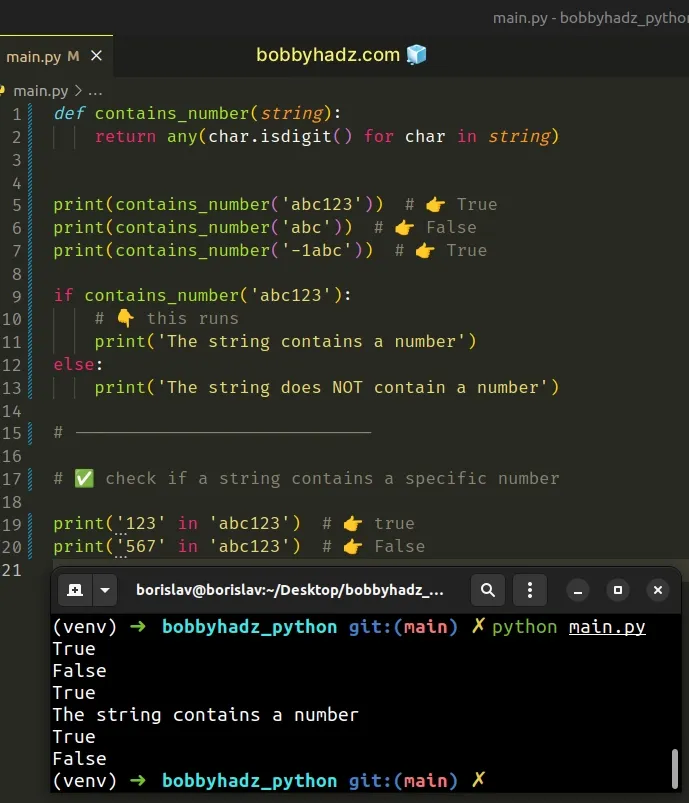
We used a generator expression to iterate over the string.
On each iteration, we use the str.isdigit() method to check if the character
is a digit.
The str.isdigit()
method returns True if all characters in the string are digits and there is at
least 1 character, otherwise False is returned.
The last step is to pass the generator object to the any() function.
def contains_number(string): return any(char.isdigit() for char in string) print(contains_number('abc123')) # 👉️ True print(contains_number('abc')) # 👉️ False print(contains_number('-1abc')) # 👉️ True
The any function
takes an iterable as an argument and returns True if any element of the
iterable is truthy.
any() function will return True if at least 1 character in the string is a number.If you need to check if a string contains a specific number, use the in
operator.
print('123' in 'abc123') # 👉️ True print('567' in 'abc123') # 👉️ False
The in operator tests
for membership. For example, x in s evaluates to True if x is a member of
s, otherwise it evaluates to False.
# Check if a string contains a number using a for loop
You can also use a for loop to check if a string contains a number.
def contains_number(string): for char in string: if char.isdigit(): return True return False print(contains_number('abc123')) # 👉️ True print(contains_number('abc')) # 👉️ False print(contains_number('-1abc')) # 👉️ True if contains_number('abc123'): # 👇️ This runs print('The string contains a number') else: print('The string does NOT contain a number')
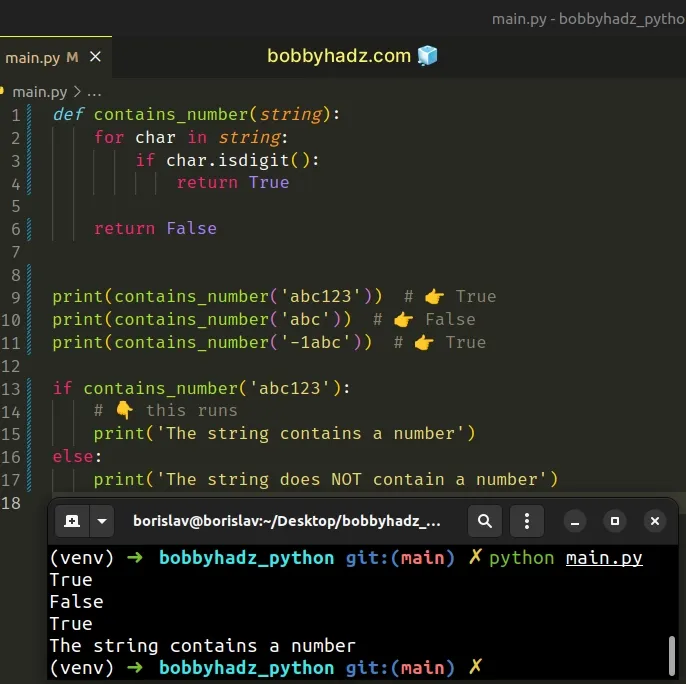
The for loop iterates over the string and checks if each character is a number
using the isdigit() method.
# Check if a string contains a number using re.search()
This is a two-step process:
- Use the
re.search()method to check if the string contains any digits. - Use the
bool()class to convert the output fromre.searchto a boolean.
import re def contains_number(string): return bool(re.search(r'\d', string)) print(contains_number('abc123')) # 👉️ True print(contains_number('abc')) # 👉️ False print(contains_number('-1abc')) # 👉️ True
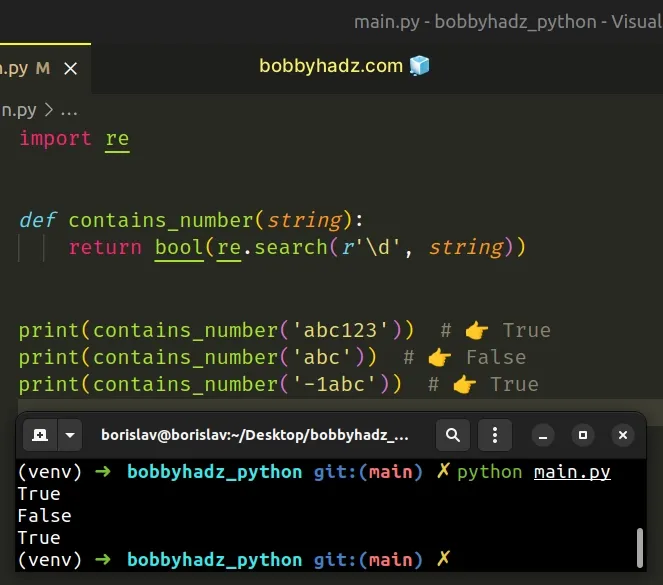
The re.search() method looks for the first location in the string where the provided regular expression produces a match.
re.search() method finds any digits, it will return amatch object, otherwise None is returned.The first argument we passed to the method is a regular expression.
The \d character matches the digits [0-9] (and many other digit characters).
If the string contains any digits, the re.search method will return a match
object, which when converted to boolean returns True.
# 👇️ <re.Match object; span=(3, 4), match='1'> print(re.search(r'\d', 'abc123')) # 👇️ None print(re.search(r'\d', 'abc'))
If the pattern is not matched in the string, the method returns None, which is a falsy value.
An alternative to using the \d character is to specify a set of digits
[0-9].
import re def contains_number(string): return bool(re.search(r'[0-9]', string)) print(contains_number('abc123')) # 👉️ True print(contains_number('abc')) # 👉️ False print(contains_number('-1abc')) # 👉️ True
The square [] brackets are used to indicate a set of characters.
In the case of [0-9], the pattern matches any digit.
# Check if a string contains a number using re.findall()
Alternatively, you can use the re.findall() method.
import re my_str = 'a12b34c56' matches = re.findall(r'\d+', my_str) print(matches) # 👉️ ['12', '34', '56'] if len(matches) > 0: print('The string contains a numebr') else: print('The string does NOT contain a number')
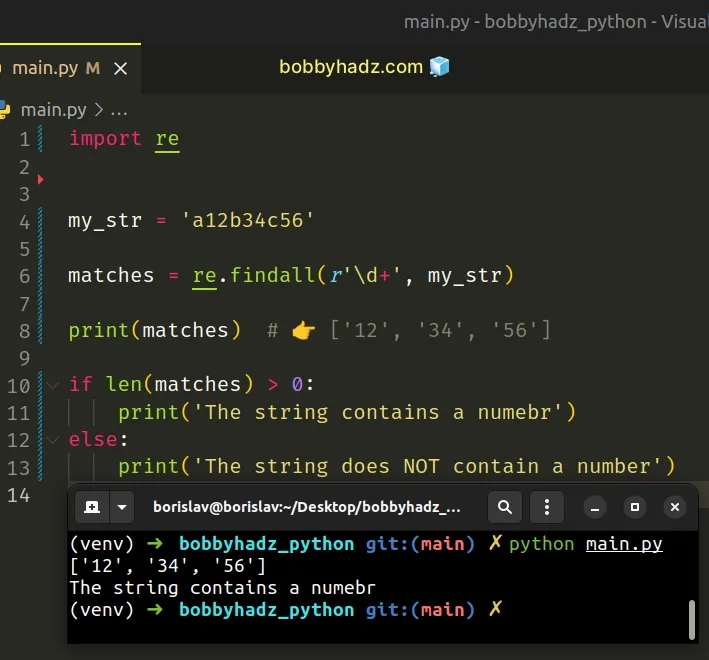
The re.findall() method takes a pattern and a string as arguments and returns a list of strings containing all non-overlapping matches of the pattern in the string.
If the list of matches has a length greater than 0, then the string contains
at least 1 number.
# Check if a string contains only Numbers in Python
You can use the str.isnumeric() method to check if a string contains only
numbers.
import re my_str = '3468910' print(my_str.isnumeric()) # 👉️ True if my_str.isnumeric(): # 👇️ This runs print('The string contains only numbers') else: print('The string does NOT contain only numbers')
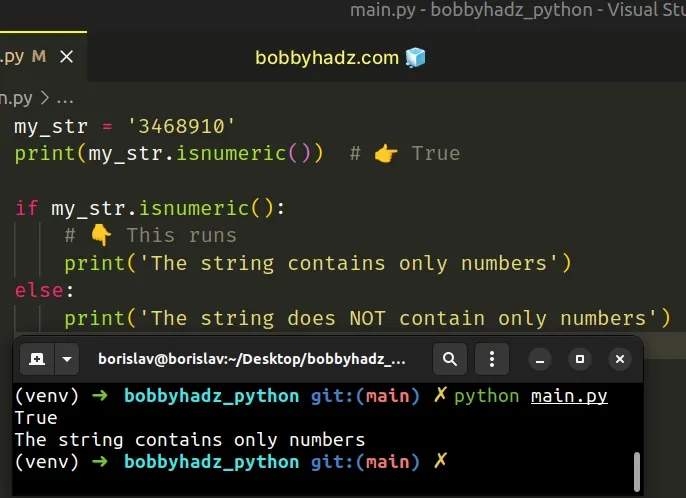
The
str.isnumeric()
method returns True if all characters in the string are numeric, and there is
at least one character, otherwise False is returned.
print('5'.isnumeric()) # 👉️ True print('50'.isnumeric()) # 👉️ True print('-50'.isnumeric()) # 👉️ False print('3.14'.isnumeric()) # 👉️ False print('A'.isnumeric()) # 👉️ False
Notice that the str.isnumeric() method returns False for negative numbers
(they contain a minus) and for floats (they contain a period).
try/except statement if you need to check if a string is a valid integer or a valid floating-point number.# ✅ Check if a string is a valid integer def is_integer(string): try: int(string) except ValueError: return False return True print(is_integer('359')) # 👉️ True print(is_integer('-359')) # 👉️ True print(is_integer('3.59')) # 👉️ False print(is_integer('3x5')) # 👉️ False # ---------------------------------------------- # ✅ Check if a string is a valid float def is_float(string): try: float(string) except ValueError: return False return True print(is_float('359')) # 👉️ True print(is_float('-359')) # 👉️ True print(is_float('3.59')) # 👉️ True print(is_float('3x5')) # 👉️ False
If converting the string to an integer or float fails, the except block runs
where we handle the ValueError by returning False from the function.
# Check if a string contains only Numbers using re.match()
Alternatively, you can use the re.match() method.
The re.match() method will return a match object if the string contains only
numbers, otherwise None is returned.
import re def only_numbers(string): return re.match(r'^[0-9]+$', string) # 👇️ <re.Match object; span=(0, 4), match='3590'> print(only_numbers('3590')) if only_numbers('3590'): # 👇️ this runs print('The string contains only numbers') else: print('The string does NOT contain only numbers')
The re.match() method
returns a match object if the provided regular expression is matched in the
string.
The match() method returns None if the string
doesn't match the regex pattern.
The first argument we passed to the re.match() method is a regular expression.
import re def only_numbers(string): return re.match(r'^[0-9]+$', string)
The square brackets [] are used to indicate a set of characters.
The 0-9 characters match the digits in the range.
^ matches the start of the string and the dollar sign $ matches the end of the string.The plus + causes the regular expression to match 1 or more repetitions of the
preceding character (the range of numbers).
If you want to return a boolean result from the function, pass the call to
re.match() to the bool() class.
import re def only_numbers(string): return bool(re.match(r'^[0-9]+$', string)) print(only_numbers('3590')) # 👉️ True print(only_numbers('3x59')) # 👉️ False if only_numbers('3590'): # 👇️ this runs print('The string contains only numbers') else: print('The string does NOT contain only numbers')
The bool() class takes a value and converts it to a boolean (True or False).
# Additional Resources
You can learn more about the related topics by checking out the following tutorials:

